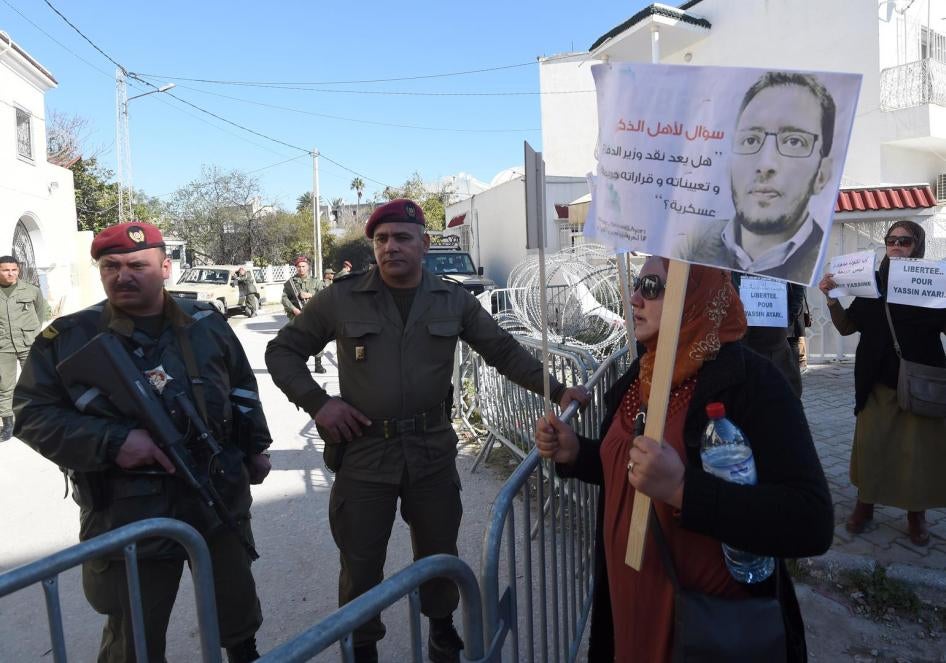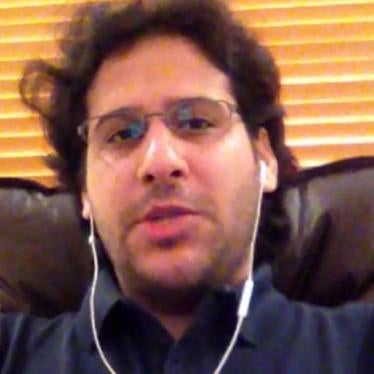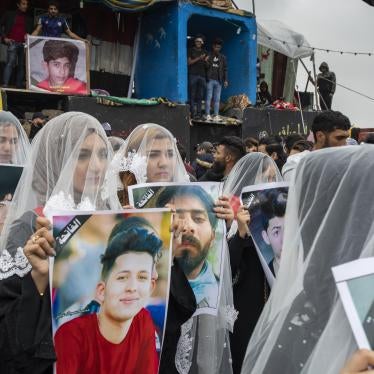(Tunis) – Tunisia’s military prosecutor should immediately drop charges against two journalists who criticized the country’s armed forces, Human Rights Watch said today.
The prosecutor charged Rached Khiari, chief editor of the newspaper and website Al Sadaa (The Echo) on November 16, 2016, with impugning the reputation of the army and undermining its morale under both the code of military justice and the penal code. On September 26, the military prosecutor charged Jamel Arfaoui, an independent journalist, with impugning the reputation of the army in an article on the website Tunisie-telegraph.com, under article 91 of the code of military justice. Both are free pending trial.
“Military courts are resorting again and again to the same article of military law to muzzle speech,” said Amna Guellali, Tunisia director at Human Rights Watch. “Instead of trying to silence critics, authorities should be fixing the laws adopted during more repressive times that criminalize criticism of institutions or public figures.”
Khiari told Human Rights Watch that he was charged following his participation in a talk show called Only for those who dare on the independent TV station Al Hiwar al Tounsi (The Tunisian Conversation). He said on the air that Tunisian authorities had signed an agreement allowing the United States to establish a military base in Tunisia, citing an October 26 Washington Post article, that attributed the information to unnamed US officials. The article said that the Pentagon had set up a drone base in Tunisia, deploying unmanned aircraft and US military personnel to conduct spying missions in neighboring Libya.
The Tunisian defense minister, Farhat Horchani, later denied the report. But on November 22, President Béji Caid Essebsi confirmed in a TV interview that he had authorized the use of unarmed US drones to conduct surveillance missions over Libya from the Tunisian territory. Khiari first appeared before the investigating judge on November 21.
The charge against Arfaoui stems from an article he published on July 30 criticizing as inadequate the army’s lack of investigation into a military plane crash that killed two officers.
Both Khiari and Arfaoui could be sentenced to up to three years in prison under article 91 of the code of military justice, which criminalizes offenses against the dignity, reputation, or morale of the army.
Khiari faces additional charges of defamation of a civil servant under article 128 of the penal code, and damaging the morale of the army to harm national defense, under article 60bis of that code, which carries a possible death penalty.
Trying Khiari and Arfaoui, both civilians, before a military tribunal violates the norm of international law that military courts should not have jurisdiction over civilians, Human Rights Watch said. The African Commission on Human and Peoples’ Rights, Principles and Guidelines on the right to fair trial and legal assistance in Africa state that military courts should not “in any circumstances whatsoever have jurisdiction over civilians.”
Prosecutions for defaming the army or other state institutions are also incompatible with Tunisia’s obligations under article 19 of the International Covenant on Civil and Political Rights (ICCPR), to which Tunisia is a party.
In 2011 the United Nations Human Rights Committee issued guidance to state parties on their free speech obligations under article 19 that emphasized the high value that the ICCPR places upon uninhibited expression “in circumstances of public debate concerning public figures in the political domain and public institutions.” It added that “State parties should not prohibit criticism of institutions, such as the army or the administration.” In its recent ruling Lohé Issa Konaté v. Burkina Faso, the African Court on Human and Peoples’ Rights said that criminal penalties for acts of defamation were incompatible with the African Charter on Human and People’s Rights.
Article 31 of Tunisia’s 2014 constitution protects the right to free speech. Tunisia’s press code, adopted through Decree Law 115 in 2011, abolished prison sentences for criminal defamation or defamation of state institutions but these offenses still exist in the penal code and the code of military justice.
After the ouster of President Zine al-Abidine Ben Ali in January 2011, the interim government overhauled the military justice system. Decree no. 69 of July 29, 2011, introduced many important reforms but did not eliminate military court jurisdiction over civilians and over non-military offenses committed by military personnel.
The military tribunal sentenced the blogger Yassine Ayari, on March 2, 2015, to six months in prison for his Facebook posts criticizing the army and its top echelons. He was held for four months before authorities provisionally released him on April 16, 2015.
The Tunisian parliament should reform all laws that provide prison terms for defaming or insulting state institutions, including the army, Human Rights Watch said.









